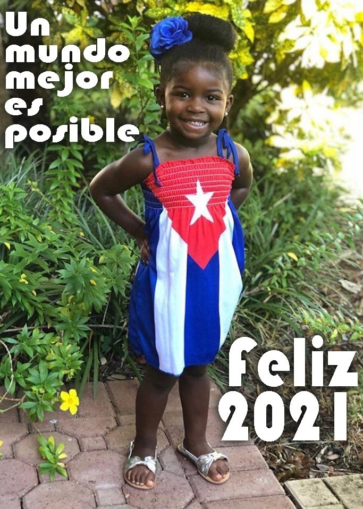Cuba’s revolution continues during the pandemic
During the first week of January, Cubans celebrated the 62nd anniversary of their great Revolution, marking the day when Fidel Castro, Che Guevara, Camilo Cienfuegos and the revolutionary forces entered Havana and ousted the U.S.-backed dictator Fulgencio Batista. Since the victory in 1959, Cuba has resisted attack after attack by U.S. imperialism and still continues on its road toward socialism.

“A better world is possible. Happy 2021!” says this child of the Cuban Revolution.
Get energized to take action to support that revolution by watching “Don’t Mess with Cuba (No Te Metas),” documenting the unbreakable determination of Cuba’s people to defend their national sovereignty.
In this just released video, hundreds of Cuban singers, dancers, actors and other cultural figures rap, “Whoever wants the truth, let them come and see” and “ My beautiful country, my flag and my identity are to be respected!”
And if the U.S. does not? Then, they sing: “We know not fear, so don’t try to work that angle!” They will be like “the Mambi warriors still wielding the machete” — the guerrilla soldiers of African, Chinese, Indigenous and Spanish descent who fought for Cuba’s independence from Spanish colonialism in the 19th century.
The English-subtitled video is available on Facebook through the Cuban Institute of Friendship with the People at tinyurl.com/ya5wydkj.
Cuba’s revolutionary health care
Cuba’s many revolutionary accomplishments include building one of the world’s most effective primary health care systems. Cuba leads the globe in the lowest patient-per-doctor ratio and has one of the world’s highest life expectancies, 77 years. (tinyurl.com/ktu7ot4)
As the U.S. staggers under a catastrophic COVID-19 infection rate, with 358,308 deaths as of Jan. 2, by the same date Cuba had only 146 deaths. (worldometer.com)
Cuba has two vaccines against the coronavirus in clinical trial, leading South America and the Caribbean in vaccine development. The revolutionary country promises to be a potential supplier to neighboring countries and to poor, remote or Indigenous communities who would struggle to access the high-priced medicines of capitalism. (tinyurl.com/y7fuuxuk)
The late revolutionary leader, President Fidel Castro, supported Cuban biotech development in the 1980s, in part because the U.S. trade blockade of the island cut off access to medical supplies and innovations. Since then, biotech has become a major part of the country’s economy.
The U.S. blockade continues in force to this day, despite the global pandemic.
Cuba is committed to solidarity with all countries struggling to maintain independence from imperialist domination. Its government shared the country’s important developments in coronavirus response as the pandemic descended on the world. More than 45 countries have requested Cuba’s Interferon Alpha 2B protocol to use in COVID-19 treatment. (Workers World, Aug. 25)
In 2005, Cuba established the Henry Reeve International Medical Brigade to aid victims of Hurricane Katrina in the U.S., although Washington rejected that aid. Now, during the pandemic, Cuba has sent 53 contingents of health workers from the Henry Reeve Brigade to over 40 countries, in addition to the Cuban medical personnel who were already working in 58 countries. (Granma, Nov. 23)
Scores of peace, justice, medical and solidarity organizations have nominated — and thousands of individuals have endorsed — Cuba’s Henry Reeve Brigade for the 2021 Nobel Peace Prize for its unprecedented contributions to the health of the world’s peoples. They hail Cuba’s “selfless humanitarian work saving lives and promoting friendship and cooperation among nations,” especially during the pandemic. (tinyurl.com/ya7vz3fg)

